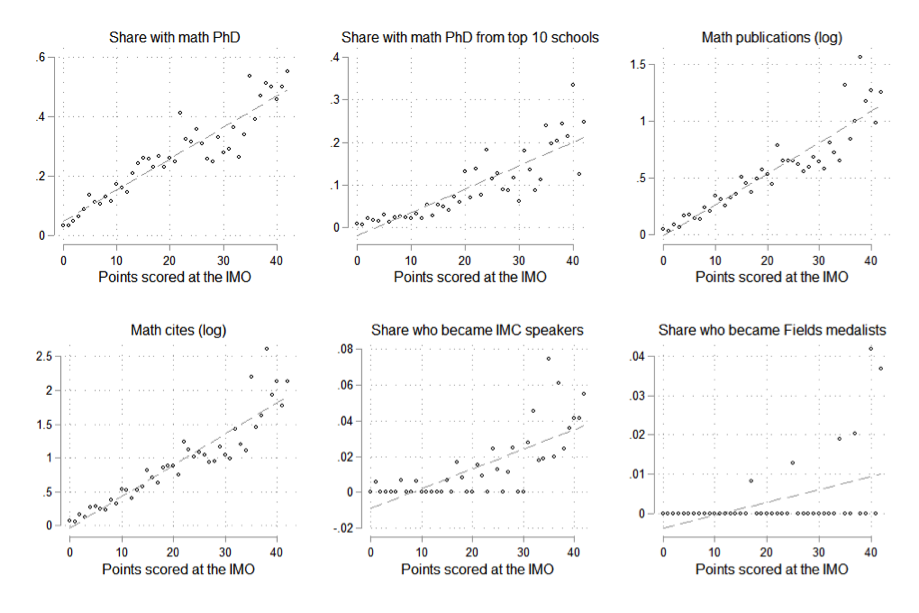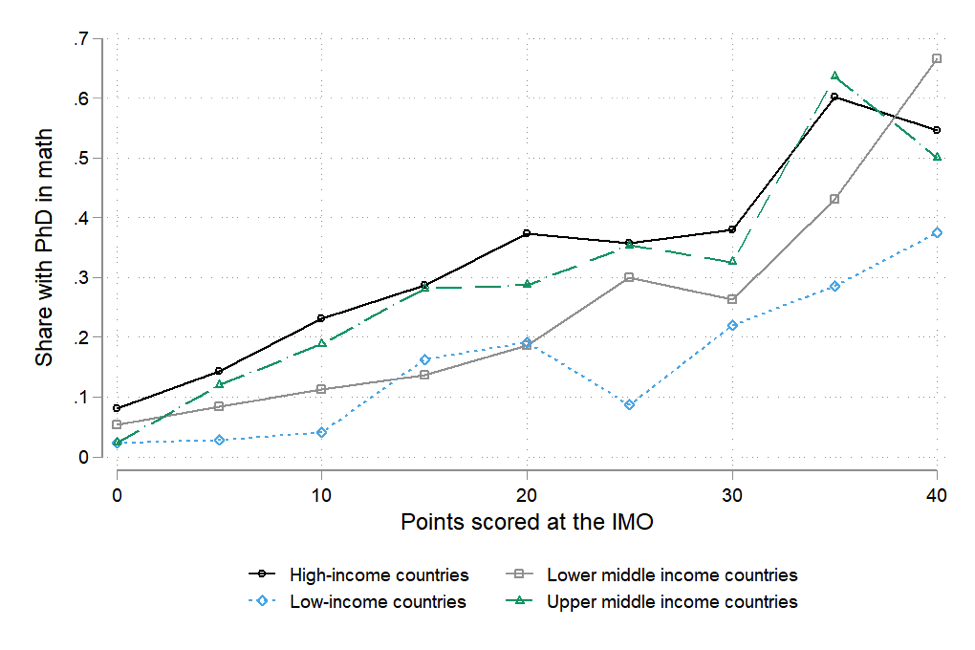The production of knowledge is often perceived to be the archetype of a cognitively demanding activity that requires some form of innate or natural ability (talent). PhD physicists are reported to have an average IQ in the neighborhood of 140. Yet, there has been little systematic study on the extent to which talented individuals become knowledge producers (or not), and how talent translates into knowledge production more generally.
In a new paper, we study how knowledge produced over a lifetime depends on talent displayed in teen years in the context of mathematics. We use a unique institutional feature of this discipline: the International Mathematics Olympiads (IMO), a prominent worldwide competition for high-school students. This setting allows us to measure talent in teenage years by their performance at the IMO. Since all participants in a given year answer the exact same questions, IMO performance is eminently comparable across multiple countries. We follow these participants over their lifetime and evaluate their lifetime knowledge production.
We find that even in this group of teenagers in the extreme right tail of the talent distribution, small differences in talent are associated with sizeable differences in long-term achievements, including getting a PhD in mathematics, number of mathematics publications and cites, and being awarded a Fields medal. For instance, each additional point scored on the IMO by a participant in their teenage year (out of a total possible score of 42) is associated with a 2.6 per cent increase in mathematics publications and a 4.5 per cent increase in mathematics citations over their lifetime.
Figure 1. Relationship between IMO scores and long-term mathematics achievements

Yet, this relationship does not hold equally across countries. Compared to their counterparts from high-income countries who obtained the same score in the IMOs, participants born in low- or middle-income countries produce considerably less knowledge over their lifetime. A participant from a low-income country produces 35 per cent fewer mathematics publications and receives over 50 per cent fewer mathematics citations than an equally talented participant from a high-income country. The cross-country income group differences in mathematics knowledge produced reflect in large part the fact that participants from low- and middle-income countries are considerably less likely to do a PhD in mathematics.
Figure 2. Share of IMO participants getting a PhD in mathematics across country-income groups

Does it matter that talented youngsters from developing countries are lost to mathematics? We estimate that knowledge production could be 10 per cent higher in terms of publications and 17 per cent higher in terms of citations if developing country participants were not lost to the world of science. But the loss could be larger still considering extreme outcomes. The chance that an IMO gold medallist will become a Fields medallist (the most prestigious award in mathematics) is fifty times larger than the corresponding probability for a PhD graduate from a top 10 mathematics program.
Why are developing country participants less likely to become professional mathematicians and produce less mathematical knowledge? Research and training capacity in the home country seems to play a role. However, other factors may also be at play. For instance, developing country participants may have different preferences or private incentives to enter different types of careers, in particular if careers outside mathematics pay more. Future research may further elucidate the role of different factors in cross-country differences in the utilisation of talent.
Various policy interventions could be used to ensure that extremely talented individuals from developing countries are not lost to the world of science. First, fellowships and financial support for top tier talent could enable such individuals to study at top tier European or American institutions, where they would access to the very best mathematics education. For instance, MIT is a pioneer in this type of activity: it does an international outreach and provides needs-based financial support to a number of international undergraduate students. More institutions could run similar programs. Second, strengthening mathematics research and training capacity in developing countries could not only improve the training of those who prefer to stay in their home country, but would also make mathematics research careers more attractive to them.
While our research has focused on mathematics, talent may also be important in other fields such as biomedicine and computer science. Policies to encourage exceptionally talented youth to pursue scientific careers — especially those from lower income countries — may facilitate the advancement of the knowledge frontier both in mathematics and beyond.
♣♣♣
Notes:
- This blog post is based on the authors’ paper Talent matters: Evidence from Mathematics, IMF Working Papers.
- The post gives the views of its authors, not the position of LSE Business Review or the London School of Economics.
- Featured image credit: Image by geralt, under a Pixabay licence
- When you leave a comment, you’re agreeing to our Comment Policy.





